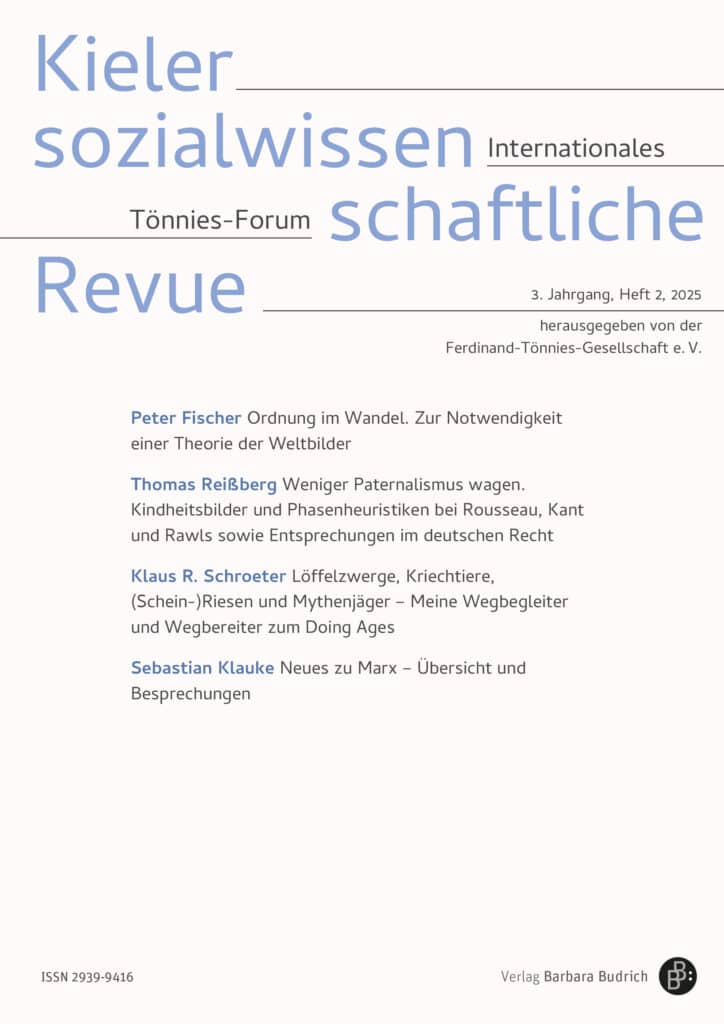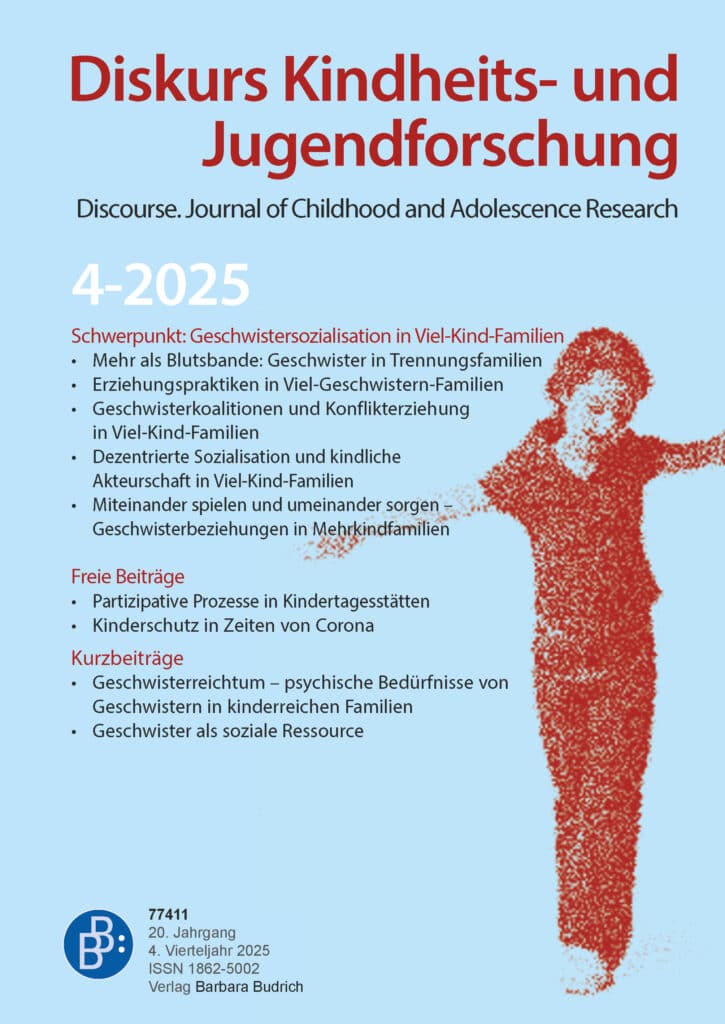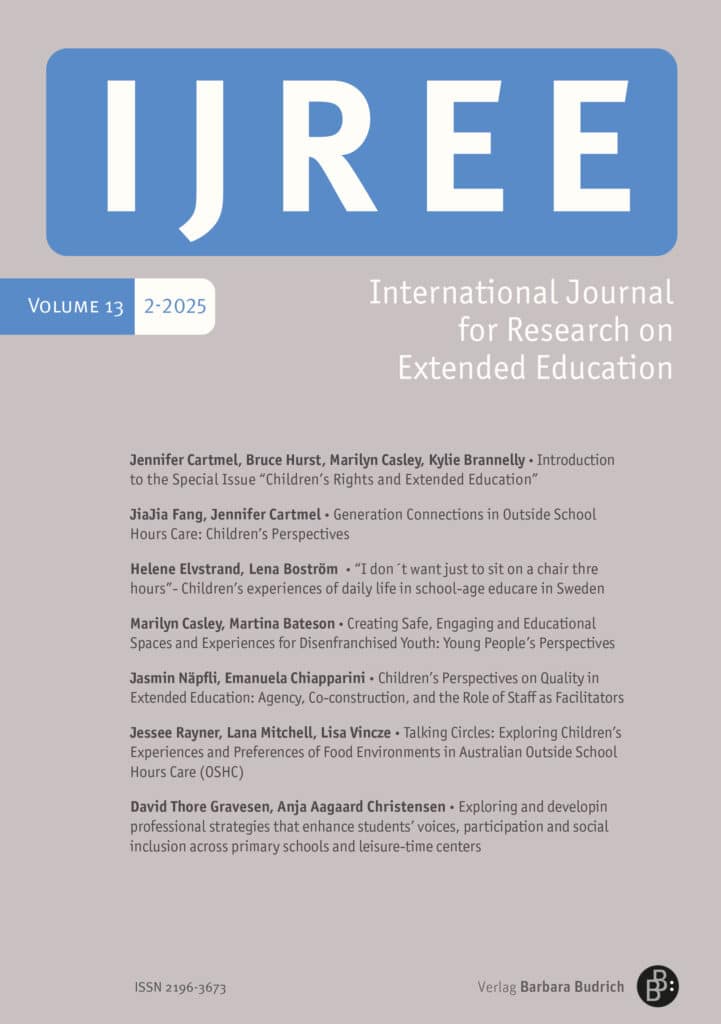Informationen zur Zeitschrift
Home » Publications » PCS 1+2-2017 | Methods for Studies in Politics, Culture & Socialization (II)
PCS 1+2-2017 | Methods for Studies in Politics, Culture & Socialization (II)
Erscheinungsdatum : 29.07.2020
84,00 €
Inhalt
PCS – Politics, Culture and Socialization
1+2-2017: Methods for Studies in Politics, Culture & Socialization (II)
Guest editors: Derek Beach, Christ’l De Landtsheer and Lieuwe Kalkhoven
Articles No. 1
Nohemi Jocabeth Echeverría Vicente / Kenneth Hemmerechts / Dimokritos Kavadias: Growing up in contexts with armed conflict: Individual exposure to large-scale violence and differences in emancipative values in Colombia and Mexico
Henk Dekker / Daniel B. German / Christ’l De Landtsheer: Political Socialization Theory, Research, and Application; History and Analysis of Forty Years of the Research Committee on Political Socialization and Education of the International Political Science Association: 1979-2019
Murray Print: Political socialization in a failed democracy: Civic education in Thailand
Lawrence R. Alschuler: Populism and the psychopolitics of morality
Articles No. 2. Special Issue on Methods for Studies in Politics, Culture & Socialization (II)
Stéphanie De Munter / Philippe De Vries: To Tweet or not to Tweet? An analysis of Twitter use during the 2014 Belgian elections
Peter Rieker: Children’s Social Participation with Peers – Some Manifestations and Conditions from the Perspective of Children
Samir Boureghda / Jurriaan Middelhoff / Christ’l De Landtsheer: Narcissism and Leadership: What we can learn from a case-study of Silvio Berluscni
Book Reviews
Daniel B. German / Song Yingfa: Handbook of Direct Democracy in Central and Eastern Europe after 1989. By Maria Marczewska-Rytko (2018)
Ekaterina Zamaraeva: New Trends in Russian Political Mentality: Putin 3.0. By Elena Shestopal (2015)
Idil Warsame: Roots of War. Wanting power, seeing threat, justifying force. By David G. Winter (2017)
Jessica Jansen: How Statesmen Think: The Psychology of International Politics. By Robert Jervis (2017)
Joya Kenens: The Political Psychology of Women in U.S. Politics. By Angela Bos & Monica Schneider (2016)
Download of Table of Contents / Inhaltsverzeichnis herunterladen
Extracts / Leseproben
Download of single articles (Open Access/fee-based): pcs.budrich-journals.com
You can register here for the PCS alert.
Einzelbeitrag-Download (Open Access/Gebühr): pcs.budrich-journals.com
Sie können sich hier für den PCS-Alert anmelden.
Zusätzliche Informationen
| Publisher | |
|---|---|
| ISSN | 1866-3427 |
| eISSN | 2196-1417 |
| Volume | 8. Jahrgang 2017 |
| Edition | 1+2 |
| Date of publication | 29.07.2020 |
| Scope | 168 |
| Language | Englisch |
| Format | 17 x 24 cm |
| DOI | https//doi.org/10.3224/pcs.v8i1-2 |
| Homepage |
Autor*innen
Keywordsarmed conflict, Belgium, Carl gustav jung, children, Colombia, Complexes, democracy, Democratic citizenship education, Elections, Emancipative values, Family, Formative socialization, Immelman midc method, International political science association, Italian politics, Italy, Jung, Mexico, Morality, Narcissism, Neoliberalism, Npi, Peers, Political communication, political education, political socialization, populism, Silvio berlusconi, social media, social participation, Thailand, Twitter
Abstracts
Growing up in contexts with armed conflict: Individual exposure to large-scale violence and differences in emancipative values in Colombia and Mexico (Nohemi Jocabeth Echeverría Vicente, Kenneth Hemmerechts, Dimokritos Kavadias)
This paper investigates the legacies of growing up in a country with large-scale armed conflict on individuals’ emancipative values. We used a most-similar case research design to analyze these consequences of armed conflict. We selected Mexico and Colombia as cases to compare, because they were similar in variables related to emancipative value preferences at the onset of our comparison. These two cases, however, varied, later on, in the level to which individuals of similar age-cohorts were exposed to largescale political violence. The results show that individuals who have grown up in a country with high levels of armed conflict tend to endorse less emancipative values in adulthood. Keywords: armed conflict, emancipative values, Mexico, Colombia, formative socialization
» Buy Single Contribution (Budrich Journals) / Einzelbeitrag kaufen (Budrich Journals)
Political Socialization Theory, Research, and Application. History and Analysis of Forty Years of the Research Committee on Political Socialization and Education of the International Political Science Association: 1997-2019 (Henk Dekker, Daniel B. German, Christ’l De Landtsheer)
The Research Committee on Political Socialization and Education of the International Political Science Association celebrated its 40th anniversary in 2019. The RC was recognized by IPSA in 1979 following a solid and successful pioneering phase in the 1960s and ‘70s. The RC flourished with a full board during 40 years, more than fifty RCPSE panels at IPSA World Congresses, more than thirty RCPSE conferences in thirteen countries, more than 60 RCPSE sponsored books, and its RCPSE journal during 27 years. Research highlights include four international comparative political socialization studies and several political socialization panel studies. For more than thirty different political orientations and behaviours it has been investigated whether political socialization contributes to the explanation of the variance therein. Research focused on eight political socialisation agents and about thirty specific political socializers in these domains. Forty years of research has yielded a lot of insights and an auspicious theory development. Some topics deserve much more attention than they have received so far while new political, economic and social developments require a retest of what was discovered about political socialization in the past and a study of the many new ways, forms and contents of political socialization at the present time and in the future.
» Buy Single Contribution (Budrich Journals) / Einzelbeitrag kaufen (Budrich Journals)
Political socialization in a failed democracy: Civic education in Thailand (Murray Print)
In 1932 Thailand became a constitutional democracy with a traditional monarchy. Since then the country has experienced twelve ‘successful’ military coups d’ etat to make it one of the most coup prone nations in the world and an unstable democracy. This paper analyses an opportunity for schools in Thailand to contribute significantly to the political socialization of young Thais as a means to address the persistent failure of the country’s democratic procedures. Non-school factors, such as authoritarian family characteristics, may negate school attempts to instill democratic behavior. Although civic education in Thai schools appears to have largely failed, the Democratic Citizenship Education Curriculum Project, developed by, with and for Thais, provides schools and teachers with the opportunity to develop democratic citizens through the school socialization process. Keywords: political socialization, democracy, democratic citizenship education
» Buy Single Contribution (Budrich Journals) / Einzelbeitrag kaufen (Budrich Journals)
Populism and the psychopolitics of morality (Lawrence R. Alschuler)
Jung’s theory of complexes sheds light on populists’ identity as the “virtuous people” who are opposed to the “corrupt elites”. Their complexes underlie three well-known populist attitudes. First is their antipluralism, their sense of moral superiority toward immigrants and minorities. Second, in reaction to the failures of neoliberalism, they experience moralistic relative deprivation regarding the “undeserving” underclasses that benefit from government hand-outs. And third, as native white Christians, their moral indignation stems from comparisons with ethnic workers in the same occupations earning the same pay. This psychopolitical analysis explains much of the populists’ anger, frustration, and resentment. Keywords: populism, morality, Jung, complexes, neoliberalism
» Buy Single Contribution (Budrich Journals) / Einzelbeitrag kaufen (Budrich Journals)
To Tweet or not to Tweet? An analysis of Twitter use during the 2014 Belgian elections (Stéphanie De Munter, Philippe De Vries)
Social media, and Twitter in particular, are playing an increasing role in the day-to-day activities of politicians (Weber Shandwick, 2014). Before the digital revolution, the relationship between the politician and the voter was intermediated by journalists and broadcast media. In contrast to traditional media, social media are presumed to enable politicians to engage directly with the electorate (Kruikemeier, Van Noort, Vliegenthart & De Vreese, 2015). In the last decade, there was a growing interest in the role of social media in election campaigns, triggered by Barack Obama’s electoral presidential election victory in 2008 and more recently by Donald Trumps’ triumph in 2016 (Rodriguez-Andres, 2018). The research presented in this article answers three main questions. First, who are the politicians using Twitter for campaigning purposes and what variables can predict Twitter use? Second, when do Belgian politicians use it and with which frequency? And third: do tweeting politicians perform better at the ballot box? The main findings reveal that a Flemish candidate has a higher probability of 18,7% to be present on Twitter compared to a candidate from the French community. Another important finding is that there is no significant association between the number of tweets and number of preferential votes, although a trend towards significance was observed for Flemish politicians. Keywords: Twitter, social media, elections, Belgium, political communication
» Buy Single Contribution (Budrich Journals) / Einzelbeitrag kaufen (Budrich Journals)
Children’s Social Participation with Peers – Some Manifestations and Conditions from the Perspective of Children (Peter Rieker)
Peers can be regarded as important for the development of children’s and youths’ social participation, since they provide the chance of reciprocal relations and cooperation between equals. Therefore, in this article, manifestations and conditions of children’s social participation with peers are analyzed on the basis of interviews with children at the age of ten to twelve years who took part in an empirical study on children’s and youths’ participation in Switzerland. In contrasting participation in peer groups with participation in adult-centered contexts, some specific aspects can be depicted based on the descriptions the children gave in the interviews. Furthermore, this article looks at different family backgrounds with respectto experience of participation and its significance for social participation with peers. Keywords: social participation, children, peers, family
» Buy Single Contribution (Budrich Journals) / Einzelbeitrag kaufen (Budrich Journals)
Narcissism and Leadership: What we can learn from a case-study of Silvio Berlusconi (Samir Boureghda, Jurriaan Middelhoff, Christ’l De Landtsheer)
There has been a sustained interest in personality of politicians, in particular aversive personality traits such as psychopathy, narcissism and machiavellianism. To overcome the hurdle of limited acces when studying political leaders, it is argued that psychodiagnostic meta-analysis methodologies can be applied in combination with validated psychological instruments. In this study the focus will be on a hypothesised narcissistic leader: Italy’s ex prime-minister Silvio Berlusconi. Using the Million Inventory of Diagnostic Criteria (MIDC) by Immelman (2004) as the at-a-distance psychodiagnostic meta-analysis tool to assess the overall personality, scales associated with narcissism will be compared to results on the well established Narcissistic Personality Inventory (NPI) to test the usability and relevance of an extended psychodiagnostic meta-analysis scale to specifically assess narcissism in political leaders. Results of the study verify that the ambitious scale of the MIDC, which is defined as the correlate with narcissism, is not sufficient to verify the presence of narcissistic traits, as hypothesised by expert-opinions. Implications of these findings are further discussed. Keywords: Narcissism, Berlusconi, Immelman MIDC method, Narcissistic Personality Inventory, NPI, Italian politics
» Buy Single Contribution (Budrich Journals) / Einzelbeitrag kaufen (Budrich Journals)
Inhalt
Inhalt
PCS – Politics, Culture and Socialization
1+2-2017: Methods for Studies in Politics, Culture & Socialization (II)
Guest editors: Derek Beach, Christ’l De Landtsheer and Lieuwe Kalkhoven
Articles No. 1
Nohemi Jocabeth Echeverría Vicente / Kenneth Hemmerechts / Dimokritos Kavadias: Growing up in contexts with armed conflict: Individual exposure to large-scale violence and differences in emancipative values in Colombia and Mexico
Henk Dekker / Daniel B. German / Christ’l De Landtsheer: Political Socialization Theory, Research, and Application; History and Analysis of Forty Years of the Research Committee on Political Socialization and Education of the International Political Science Association: 1979-2019
Murray Print: Political socialization in a failed democracy: Civic education in Thailand
Lawrence R. Alschuler: Populism and the psychopolitics of morality
Articles No. 2. Special Issue on Methods for Studies in Politics, Culture & Socialization (II)
Stéphanie De Munter / Philippe De Vries: To Tweet or not to Tweet? An analysis of Twitter use during the 2014 Belgian elections
Peter Rieker: Children’s Social Participation with Peers – Some Manifestations and Conditions from the Perspective of Children
Samir Boureghda / Jurriaan Middelhoff / Christ’l De Landtsheer: Narcissism and Leadership: What we can learn from a case-study of Silvio Berluscni
Book Reviews
Daniel B. German / Song Yingfa: Handbook of Direct Democracy in Central and Eastern Europe after 1989. By Maria Marczewska-Rytko (2018)
Ekaterina Zamaraeva: New Trends in Russian Political Mentality: Putin 3.0. By Elena Shestopal (2015)
Idil Warsame: Roots of War. Wanting power, seeing threat, justifying force. By David G. Winter (2017)
Jessica Jansen: How Statesmen Think: The Psychology of International Politics. By Robert Jervis (2017)
Joya Kenens: The Political Psychology of Women in U.S. Politics. By Angela Bos & Monica Schneider (2016)
Download of Table of Contents / Inhaltsverzeichnis herunterladen
Extracts / Leseproben
Download of single articles (Open Access/fee-based): pcs.budrich-journals.com
You can register here for the PCS alert.
Einzelbeitrag-Download (Open Access/Gebühr): pcs.budrich-journals.com
Sie können sich hier für den PCS-Alert anmelden.
Bibliography
Zusätzliche Informationen
| Publisher | |
|---|---|
| ISSN | 1866-3427 |
| eISSN | 2196-1417 |
| Volume | 8. Jahrgang 2017 |
| Edition | 1+2 |
| Date of publication | 29.07.2020 |
| Scope | 168 |
| Language | Englisch |
| Format | 17 x 24 cm |
| DOI | https//doi.org/10.3224/pcs.v8i1-2 |
| Homepage |
Produktsicherheit
Bewertungen (0)
Bewertungen
Es gibt noch keine Bewertungen.
Authors
Autor*innen
Tags
Keywordsarmed conflict, Belgium, Carl gustav jung, children, Colombia, Complexes, democracy, Democratic citizenship education, Elections, Emancipative values, Family, Formative socialization, Immelman midc method, International political science association, Italian politics, Italy, Jung, Mexico, Morality, Narcissism, Neoliberalism, Npi, Peers, Political communication, political education, political socialization, populism, Silvio berlusconi, social media, social participation, Thailand, Twitter
Abstracts
Abstracts
Growing up in contexts with armed conflict: Individual exposure to large-scale violence and differences in emancipative values in Colombia and Mexico (Nohemi Jocabeth Echeverría Vicente, Kenneth Hemmerechts, Dimokritos Kavadias)
This paper investigates the legacies of growing up in a country with large-scale armed conflict on individuals’ emancipative values. We used a most-similar case research design to analyze these consequences of armed conflict. We selected Mexico and Colombia as cases to compare, because they were similar in variables related to emancipative value preferences at the onset of our comparison. These two cases, however, varied, later on, in the level to which individuals of similar age-cohorts were exposed to largescale political violence. The results show that individuals who have grown up in a country with high levels of armed conflict tend to endorse less emancipative values in adulthood. Keywords: armed conflict, emancipative values, Mexico, Colombia, formative socialization
» Buy Single Contribution (Budrich Journals) / Einzelbeitrag kaufen (Budrich Journals)
Political Socialization Theory, Research, and Application. History and Analysis of Forty Years of the Research Committee on Political Socialization and Education of the International Political Science Association: 1997-2019 (Henk Dekker, Daniel B. German, Christ’l De Landtsheer)
The Research Committee on Political Socialization and Education of the International Political Science Association celebrated its 40th anniversary in 2019. The RC was recognized by IPSA in 1979 following a solid and successful pioneering phase in the 1960s and ‘70s. The RC flourished with a full board during 40 years, more than fifty RCPSE panels at IPSA World Congresses, more than thirty RCPSE conferences in thirteen countries, more than 60 RCPSE sponsored books, and its RCPSE journal during 27 years. Research highlights include four international comparative political socialization studies and several political socialization panel studies. For more than thirty different political orientations and behaviours it has been investigated whether political socialization contributes to the explanation of the variance therein. Research focused on eight political socialisation agents and about thirty specific political socializers in these domains. Forty years of research has yielded a lot of insights and an auspicious theory development. Some topics deserve much more attention than they have received so far while new political, economic and social developments require a retest of what was discovered about political socialization in the past and a study of the many new ways, forms and contents of political socialization at the present time and in the future.
» Buy Single Contribution (Budrich Journals) / Einzelbeitrag kaufen (Budrich Journals)
Political socialization in a failed democracy: Civic education in Thailand (Murray Print)
In 1932 Thailand became a constitutional democracy with a traditional monarchy. Since then the country has experienced twelve ‘successful’ military coups d’ etat to make it one of the most coup prone nations in the world and an unstable democracy. This paper analyses an opportunity for schools in Thailand to contribute significantly to the political socialization of young Thais as a means to address the persistent failure of the country’s democratic procedures. Non-school factors, such as authoritarian family characteristics, may negate school attempts to instill democratic behavior. Although civic education in Thai schools appears to have largely failed, the Democratic Citizenship Education Curriculum Project, developed by, with and for Thais, provides schools and teachers with the opportunity to develop democratic citizens through the school socialization process. Keywords: political socialization, democracy, democratic citizenship education
» Buy Single Contribution (Budrich Journals) / Einzelbeitrag kaufen (Budrich Journals)
Populism and the psychopolitics of morality (Lawrence R. Alschuler)
Jung’s theory of complexes sheds light on populists’ identity as the “virtuous people” who are opposed to the “corrupt elites”. Their complexes underlie three well-known populist attitudes. First is their antipluralism, their sense of moral superiority toward immigrants and minorities. Second, in reaction to the failures of neoliberalism, they experience moralistic relative deprivation regarding the “undeserving” underclasses that benefit from government hand-outs. And third, as native white Christians, their moral indignation stems from comparisons with ethnic workers in the same occupations earning the same pay. This psychopolitical analysis explains much of the populists’ anger, frustration, and resentment. Keywords: populism, morality, Jung, complexes, neoliberalism
» Buy Single Contribution (Budrich Journals) / Einzelbeitrag kaufen (Budrich Journals)
To Tweet or not to Tweet? An analysis of Twitter use during the 2014 Belgian elections (Stéphanie De Munter, Philippe De Vries)
Social media, and Twitter in particular, are playing an increasing role in the day-to-day activities of politicians (Weber Shandwick, 2014). Before the digital revolution, the relationship between the politician and the voter was intermediated by journalists and broadcast media. In contrast to traditional media, social media are presumed to enable politicians to engage directly with the electorate (Kruikemeier, Van Noort, Vliegenthart & De Vreese, 2015). In the last decade, there was a growing interest in the role of social media in election campaigns, triggered by Barack Obama’s electoral presidential election victory in 2008 and more recently by Donald Trumps’ triumph in 2016 (Rodriguez-Andres, 2018). The research presented in this article answers three main questions. First, who are the politicians using Twitter for campaigning purposes and what variables can predict Twitter use? Second, when do Belgian politicians use it and with which frequency? And third: do tweeting politicians perform better at the ballot box? The main findings reveal that a Flemish candidate has a higher probability of 18,7% to be present on Twitter compared to a candidate from the French community. Another important finding is that there is no significant association between the number of tweets and number of preferential votes, although a trend towards significance was observed for Flemish politicians. Keywords: Twitter, social media, elections, Belgium, political communication
» Buy Single Contribution (Budrich Journals) / Einzelbeitrag kaufen (Budrich Journals)
Children’s Social Participation with Peers – Some Manifestations and Conditions from the Perspective of Children (Peter Rieker)
Peers can be regarded as important for the development of children’s and youths’ social participation, since they provide the chance of reciprocal relations and cooperation between equals. Therefore, in this article, manifestations and conditions of children’s social participation with peers are analyzed on the basis of interviews with children at the age of ten to twelve years who took part in an empirical study on children’s and youths’ participation in Switzerland. In contrasting participation in peer groups with participation in adult-centered contexts, some specific aspects can be depicted based on the descriptions the children gave in the interviews. Furthermore, this article looks at different family backgrounds with respectto experience of participation and its significance for social participation with peers. Keywords: social participation, children, peers, family
» Buy Single Contribution (Budrich Journals) / Einzelbeitrag kaufen (Budrich Journals)
Narcissism and Leadership: What we can learn from a case-study of Silvio Berlusconi (Samir Boureghda, Jurriaan Middelhoff, Christ’l De Landtsheer)
There has been a sustained interest in personality of politicians, in particular aversive personality traits such as psychopathy, narcissism and machiavellianism. To overcome the hurdle of limited acces when studying political leaders, it is argued that psychodiagnostic meta-analysis methodologies can be applied in combination with validated psychological instruments. In this study the focus will be on a hypothesised narcissistic leader: Italy’s ex prime-minister Silvio Berlusconi. Using the Million Inventory of Diagnostic Criteria (MIDC) by Immelman (2004) as the at-a-distance psychodiagnostic meta-analysis tool to assess the overall personality, scales associated with narcissism will be compared to results on the well established Narcissistic Personality Inventory (NPI) to test the usability and relevance of an extended psychodiagnostic meta-analysis scale to specifically assess narcissism in political leaders. Results of the study verify that the ambitious scale of the MIDC, which is defined as the correlate with narcissism, is not sufficient to verify the presence of narcissistic traits, as hypothesised by expert-opinions. Implications of these findings are further discussed. Keywords: Narcissism, Berlusconi, Immelman MIDC method, Narcissistic Personality Inventory, NPI, Italian politics
» Buy Single Contribution (Budrich Journals) / Einzelbeitrag kaufen (Budrich Journals)









Bewertungen
Es gibt noch keine Bewertungen.